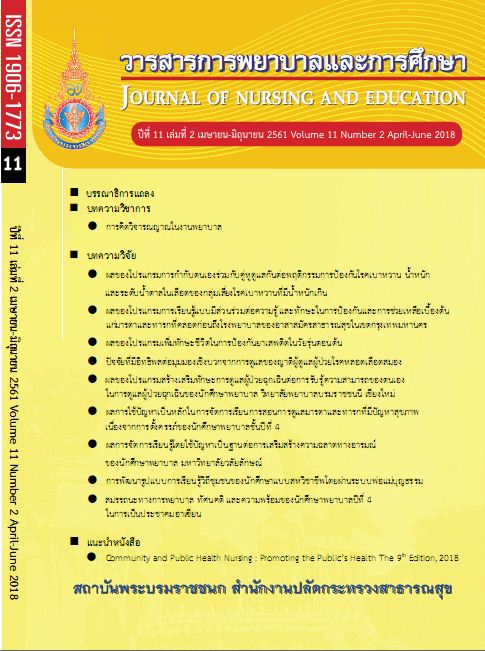The Effects of Self-Regulation with Buddy Care Program on Diabetes Preventive Behaviors, Body Weight, and Blood Sugar Level among Overweight Pre-Diabetes
ผลของโปรแกรมการกำกับตนเองร่วมกับคู่หูดูแลกันต่อพฤติกรรมการป้องกันโรคเบาหวาน น้ำหนัก และระดับน้ำตาลในเลือด ของกลุ่มเสี่ยงโรคเบาหวานที่มีน้ำหนักเกิน
คำสำคัญ:
การกำกับตนเอง, คู่หูดูแลกัน, พฤติกรรมการป้องกันโรคเบาหวาน, ระดับน้ำตาลในเลือด, กลุ่มเสี่ยงโรคเบาหวานบทคัดย่อ
บทคัดย่อ
การป้องกันโรคย่อมดีกว่าการรักษา การมีพฤติกรรมที่เหมาะสม จะทำให้กลุ่มเสี่ยงโรคเบาหวานสามารถป้องกันโรคเบาหวานได้ การวิจัยกึ่งทดลองนี้มีวัตถุประสงค์ เพื่อศึกษาผลของโปรแกรมการกำกับตนเองร่วมกับคู่หูดูแลกันต่อพฤติกรรมการป้องกันโรคเบาหวาน น้ำหนัก และระดับน้ำตาลในเลือดของกลุ่มเสี่ยงโรคเบาหวานที่มีน้ำหนักเกิน กลุ่มตัวอย่างเป็นกลุ่มเสี่ยงโรคเบาหวานที่มีน้ำหนักเกินในตำบลโพรงอากาศ อำเภอบางน้ำเปรี้ยว จังหวัดฉะเชิงเทรา สุ่มตัวอย่างแบบกลุ่มตามหมู่บ้านจากพื้นที่ที่แบ่งออกเป็นสองส่วน แล้วสุ่มกลุ่มตัวอย่างเข้าเป็นกลุ่มทดลองและกลุ่มเปรียบเทียบ ด้วยการจับฉลากพื้นที่ ได้กลุ่มทดลอง จำนวน 28 คน และเข้ากลุ่มเปรียบเทียบจำนวน 28 คน หลังจากนั้นให้กลุ่มทดลองเข้าร่วมกิจกรรมการกำกับตนเองร่วมกับคู่หูดูแลกัน เป็นเวลานาน 12 สัปดาห์
ส่วนกลุ่มเปรียบเทียบให้ได้รับการดูแลตามปกติ ประเมินผลก่อนและหลังได้รับกิจกรรมโดยใช้แบบประเมินพฤติกรรมการป้องกันโรคเบาหวาน ชั่งน้ำหนัก ตรวจหาค่าระดับน้ำตาลในเลือด วิเคราะห์ข้อมูลด้วยสถิติพรรณนา ไค-สแควร์ (Chi-square) และค่าทีอิสระ (Independent t-test)
ผลการวิจัยพบว่า หลังการเข้าร่วมกิจกรรมการกำกับตนเองร่วมกับคู่หูดูแลกัน กลุ่มทดลอง มีค่าเฉลี่ยพฤติกรรมการป้องกันโรคเบาหวานเพิ่มขึ้นมากกว่ากลุ่มเปรียบเทียบอย่างมีนัยสำคัญทางสถิติ ที่ระดับ < .01 มีค่าเฉลี่ยน้ำหนักลดลงมากกว่ากลุ่มเปรียบเทียบอย่างมีนัยสำคัญทางสถิติที่ระดับ < .01
แต่มีค่าเฉลี่ยระดับน้ำตาลในเลือดระหว่างสองกลุ่มลดลงแตกต่างกันอย่างไม่มีนัยสำคัญ (p = .054). ผลการวิจัยครั้งนี้แสดงว่าการกำกับตนเองร่วมกับคู่หูดูแลกันมีประสิทธิผลบางส่วนในการป้องกันโรคเบาหวานในกลุ่มเสี่ยง โดยเพิ่มพฤติกรรมการป้องกันโรคเบาหวานและลดปัจจัยเสี่ยงด้านน้ำหนักในกลุ่มเสี่ยง ซึ่งพยาบาลและบุคลากรทางด้านสุขภาพที่ปฏิบัติงานในโรงพยาบาลส่งเสริมสุขภาพตำบลสามารถใช้เป็นแนวทางในการให้บริการเพื่อส่งเสริมการปรับเปลี่ยนพฤติกรรมการป้องกันโรคเบาหวานและส่งเสริมการลดน้ำหนักในกลุ่มเสี่ยงเบาหวาน โดยยังคงต้องการการศึกษาซ้ำเกี่ยวกับผลของโปรแกรมในการลดระดับน้ำตาลในเลือดในกลุ่มเสี่ยง
เอกสารอ้างอิง
1. WHO. Diabetes mellitus. [Online] 2015. [cited 2015/11/13]. Available from:
http://www.who.int/mediacentre/factsheets/fs138/en/
2. Bureau of Non Communicable Disease, Department of disease Control, Ministry of Public Health. [Online] 2015 [cited 2015/11/13]. Available from: http://www.thaincd.com/document/file/info/brfss/NCDs%20Surveillance%20Indicators%20by%20Gender.rar (in Thai)
3. Institute for Population and Socail Research, Mahidol University. Thai Health 2014: Local Self-Management Community to Reform the Country from Foundations. Nakhon Pathom: Amarin Printing & Publishing; 2014. (in Thai)
4. Chinno, S. Consumption Habits of People in Risk of Diabetes Mellitus, Nakhu District, Kalasin Province. Master of Public Health, Faculty of Public Health, Burapha University; 2010. (inThai)
5. Duangkaew, N. Health Belief and Preventive Behaviors of Risk Group
Diabetes Mellitus in Ko Kha District, Lumpang Province. Master of Public Health, Faculty of Public Health, Chiang Mai University; 2010. (in Thai)
6. Bandura, A. Social foundations of though and action: A social cognitive theory. Michigan: Prentice-Hall; 1986.
7. Tonget, M. Effects of Application of Self-Regulation Program and Social Support for Controlling Gycemic Among Non-Insulin Dependent Diabetes Mellitus Patients in
Bua Ngam Health Promotion Hospital in Bua Ngam Sub-district, Det Udom District, Ubon Rachatani Province. Master of Public Health, Faculty of Public Health, Mahasarakham University; 2011. (in Thai)
8. Baiphimai, J. The Effects of Self-Regulation with Clinical Information on Glycemic Control Behavior and Glycosyted Hemoglobin Level Among Uncontrolled Type 2 Diabetes Patients. Master of Nursing Science, Community Nurse Practitioner, Faculty of Nursing, Burapha University; 2016. (in Thai)
9. Kaenphueak, Y. Outcomes of Self-Regulation on Eating Behavior and Brisk Walk for
Weight Control in Overweight Women. Master of Nursing Science, Community Nurse Practitioner, Faculty of Nursing, Burapha University; 2014. (in Thai)
10. Long JA. ''Buddy system'' of peer mentors may help control diabetes. LDI Issue Brief. 2012;17(6):1-4.
11. Cohen J. A power primer. Psychological Bulletin; 1992. 112(1), 115-119.
12. Rotheram-Borus MJ, Tomlinson M, Gwegwe M, Comulada WS, Kaufman N, Keim M.
Diabetes buddies: peer support through a mobile phone buddy system. Diabetes Educ.
2012;38(3):357-65.
13. Threedet, J. Impact of Companionship for Behavioral Modificaation of
Diabetes Mellitus Type 2 Patients through Health Belief Model of Community
HealthCenter, Namsom Hospital, Udonthani Province. Master of Public Health Faculty of
Public Health, Mahasarakham University; 2014. (in Thai)
14. Hamman RF, Wing RR, Edelstein SL, Lachin JM, Bray GA, Delahanty
L & Diabetes Prevention Program Research G. Effect of Weight Loss With Lifestyle
Intervention on Risk of Diabetes. Diabetes Care; 2006. 29(9), 2102-2107






